A few weeks ago Mrs Rougier told me that she has made a start on a new novel. The provisional title is NONESUCH. I have no idea when it is likely to be ready, but she is a fast worker and I have little doubt but that the manuscript will be ready for publication in the early autumn.
A.S. Frere to Derek Priestley, letter, 26 March 1962
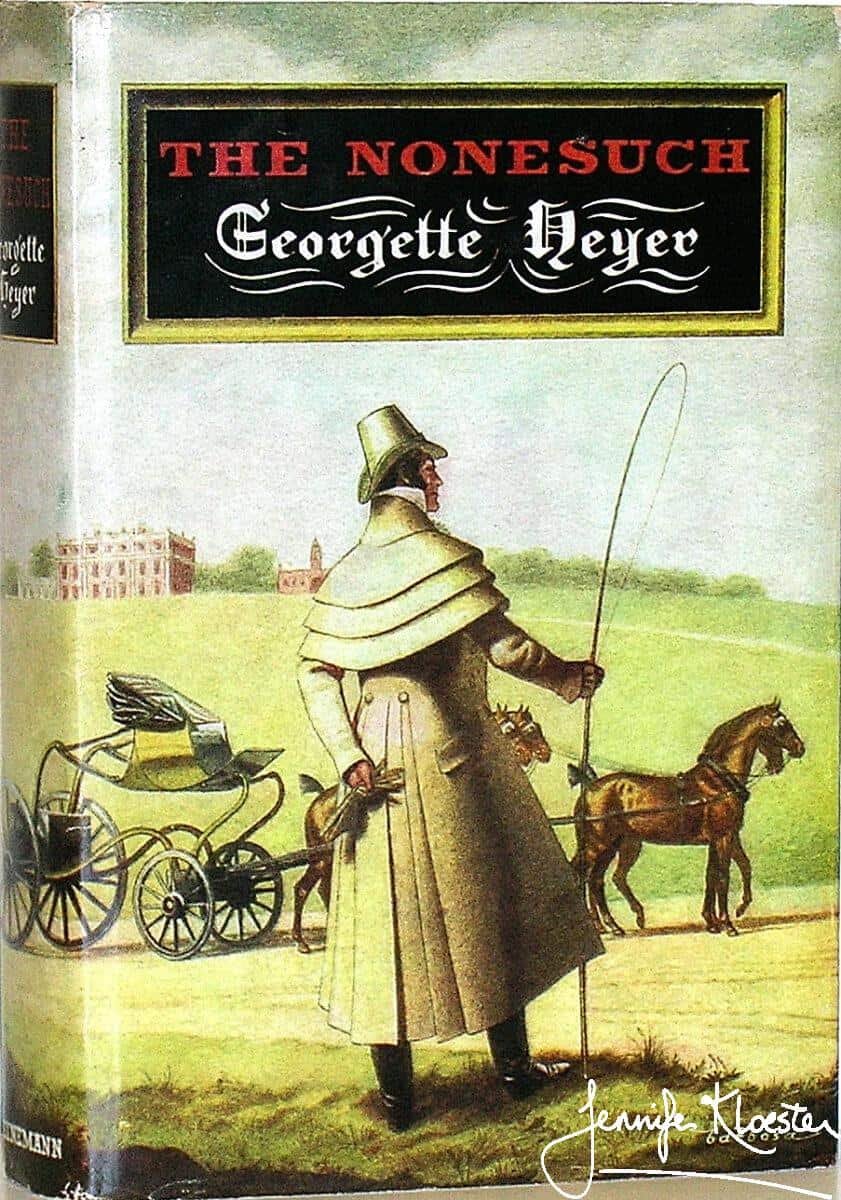
“fantastic demands”
Just two months after the publication of A Civil Contract in October 1961, Georgette had begun turning her mind to a new novel. She had two ideas for the book but was not sure which one to write. Among her letters from the period is one she wrote to her close friend and publisher, A.S. Frere. He and his wife, her adored Pat Wallace, had just returned from their holiday in the south of France and Georgette wrote them a long letter in which she penned this one all-too tantalising sentence as to what the new story might be about:
Darling-Frere, I cannot think whether I will write Manifold, or Gideon – but one or the other I must write, if the fantastic demands of the I.R. are to be met. Come & dine with us both of you , & I will be incredibly boring about My Art.
Georgette Heyer to A.S. Frere, letter, 21 December 1961.
Unsurprisingly, in the era of super-tax as high as 95 pence in the pound, Georgette and Ronald still resented the Inland Revenue’s (I.R.) depredations on their income. And there were other financial problems beleaguring them, including the problem of Heron, the company set up to hold her copyrights, as well as the money accruing in the company account which they could not touch without a large tax bill. But these worries were for the future and not to be thought of when Georgette was planning a new book and her son’s wedding. The book was to be The Nonesuch and the wedding was to be in June.
“Manifold or Gideon”?
Manifold, of course, would eventually appear as the name of her next hero’s principal residence which Georgette would describe as his “very beautiful house in Gloucestershire, which has been in his family for generations.” Gideon might have been anyone but the knowing reader will instantly recognise the name as the one given to Georgette’s handsome young Lifeguardsman in her 1949 novel, The Foundling. Captain Gideon Ware has long been a favourite among Heyer readers. As cousin to The Foundling’s hero he is only a secondary character in the novel but still plays a vital role with several memorable appearances. All of this has left many readers longing for “more Gideon”, which makes the mention of the name in Heyer’s letter an intriguing clue. The wish has often been expressed that he should have his own novel and perhaps it was this Gideon to whom Heyer was referring in her letter to Frere. We will never know for sure, but whether she did or didn’t think of writing a book about Gideon Ware, in the end she chose to write a book in which the word Manifold refers merely to a great house and one which, in the end, plays no actual role in the novel she was to write. As she told Frere at the end of her letter: “Do you want to know about the NONESUCH – Well, ALL RIGHT! I wasn’t going to tell you, so you needn’t start a Donald Duck before you’re hurt! How could I tell you what I don’t know, Stoopid?” This as her way of telling her publisher that the book was in the making but not yet begun!

Inspiration from the north
In March 1962, Georgette and Ronald travelled north to Lancashire, there to attend a Water Enquiry at Accrington and the Northern Optical Conference in Southport. Ronald’s law practice was mainly centred in water rights and utilities (hence one of the plot threads of Detection Unlimited) and in 1959 he had been made a Queen’s Counsel (QC). A year later he had received a Privy Council Appointment as Chairman of the General Optical Council, the regulator for the optical professions in the UK. He was proud of the role but it meant having to sometimes travel out of London and attend a variety of official functions, conferences and banquets. Georgette’s strong sense of loyalty meant that she was at times required to accompany him to these social events even though she intensely disliked gatherings of this kind. As she told a friend: “All the banquets and congresses I can’t get out of–plus a succession of Expensive Full Evening Dresses, with pale gloves no use after the first wearing, none of which I have the least other use for.” Excrutiatingly shy and never truly comfortable at large social events full of unfamiliar people, Georgette did her best to socialise but often found that her “face soon ached with its Pleased Smile.” There were benefits, however, not least of which was meeting some interesting and charismatic people – some of whom (as was her habit) she undoubtedly put into her books. At one such dinner during the Lancashire trip she was delighted to meet the town’s mayor who turned out to be “a Honey”:
…we went on to Southport, to attend the last few days of the Northern Optical conference. This wasn’t as grim as I’d expected. For one thing, Southport is quite a good sort of place; and to go on with the Prince of Wales Hotel there is first-class. It was extremely exhausting, however, not the least wearing features being the Absolute Necessity of fitting the right names to the right faces. Very few of the delegates came out of quite one’s own drawer, so great care had to be taken not to offend tender susceptibilities. We were given the V.I.P. treatment, too, which meant that my face soon ached with its Pleased Smile. No respite, either – since nearly all the worthy people were staying in the P. of W. However, I had an unexpected reward. At the Banquet, I found myself (as I had gloomily prophesied) seated on the Mayor’s right – and he turned out to be a Honey! He informed me at the outset that he was a plumber, and he had the instinctive savoir faire which characterized Bevin, and is so endearing. I may mention that he won my heart at the outset by telling me that “Ee, he was glad to have me beside him, because he had wanted, at the Ball on the previous night, to coom a bit closer to me, because he couldn’t hear all I said, but enough to show him that I was “a natural-born ‘umorist!” so was he! We had a splendid time – and a lovely talk about cricket, with particular reference to Brian Statham. His poor little wife was scared white, but doing her best to live up to him. I sat and talked to her for a little while after dinner, and when I said how sick she must be of being charming to hoards of strangers, she confided that it was all right when they were nice people, but she didn’t like it when they were stook-oop. I said that such persons weren’t worth a thought, to which she replied wistfully that that was what the mayor said, only the fact was she wasn’t much of a one for the Social.
Georgette Heyer to A.S. Frere, letter, 20 March 1962.
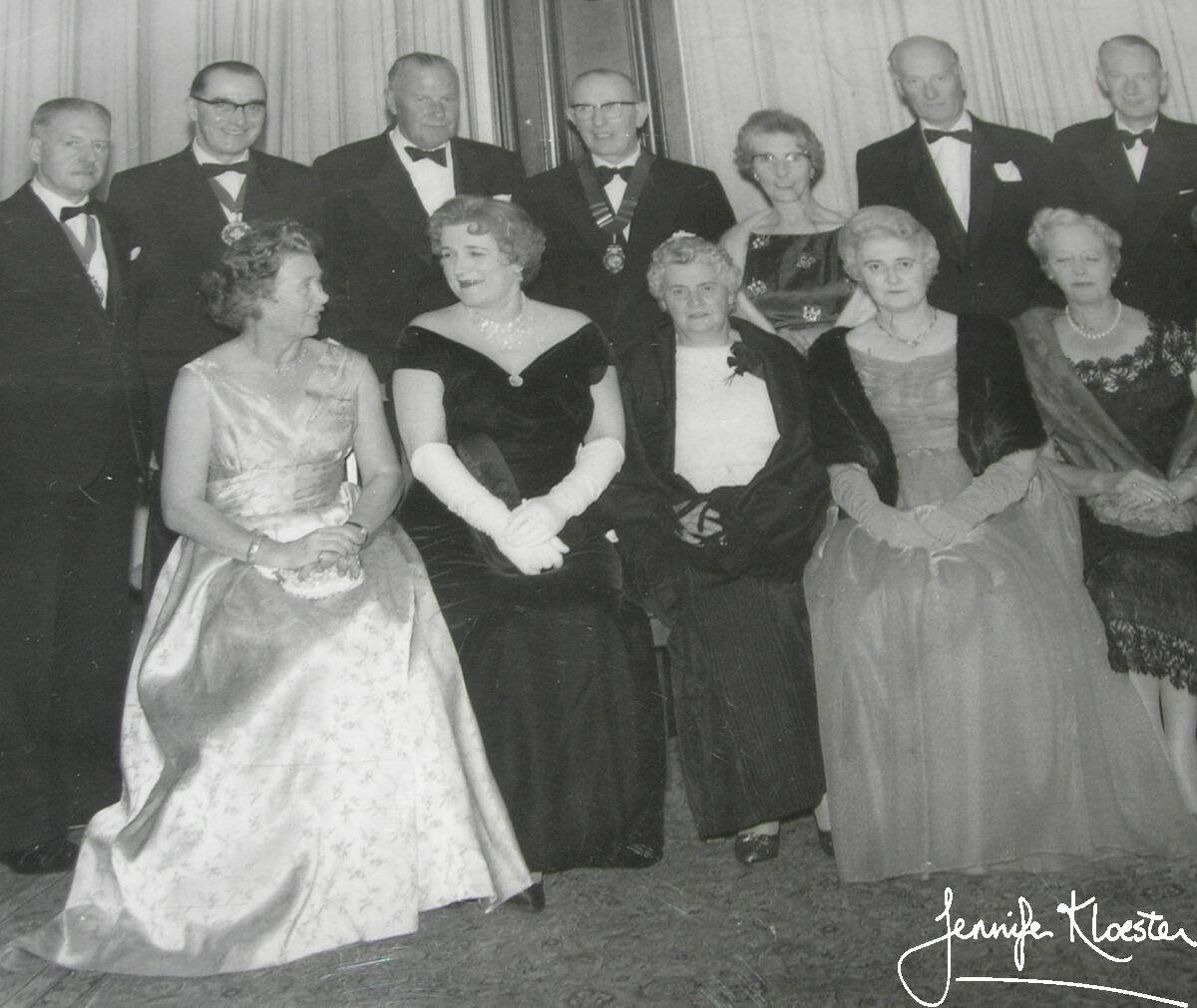
“3 or 4 families in a country village”
Inspired by her trip to the north of England and no doubt by some of the people she met in Southport (could one of the ladies in the above photo have possibly inspired her characters of Mrs Underhill or Mrs Mickleby?) Georgette set her new novel in Yorkshire’s West Riding, a little way east of Lancashire. Set well away from the swirl and glamour of London society, in writing The Nonesuch Heyer followed Jane Austen’s recommendation to her niece that “3 or 4 families in a country village is the very thing to work on”. Heyer’s fictional village is called Oversett, which she described as being: “rather closer to Leeds than to Harrogate, and not above twenty miles from York”. The story was to be Austenesque in several ways for there is prejudice here and a (rather inane) misunderstanding between hero and heroine; the heroine is an older female who has (like Anne Elliot) resigned herself to a life without love and marriage; both sense and sensibility are on display throughout; the very spoilt Tiffany Wield has as many complaints as Mary Musgrove; while Patience Chartley is as good and as modest as poor Fanny Price. Oversett would prove to be a kind of microcosm of Regency society with its wealthy and not-so wealthy families, its social hierarchy, factions, prejudices and gossip. Gossip plays an important role in the novel which is centred on the ways in which the wealthy families in the village react to the news that Sir Waldo Hawkridge – the Nonesuch of the title – is on his way to Oversett to inspect his recently-inherited house, Broom Hall. The news causes a great stir in the village and the reader learns much about the different residents’ characters and outlook from their various reactions to the great man’s projected visit.
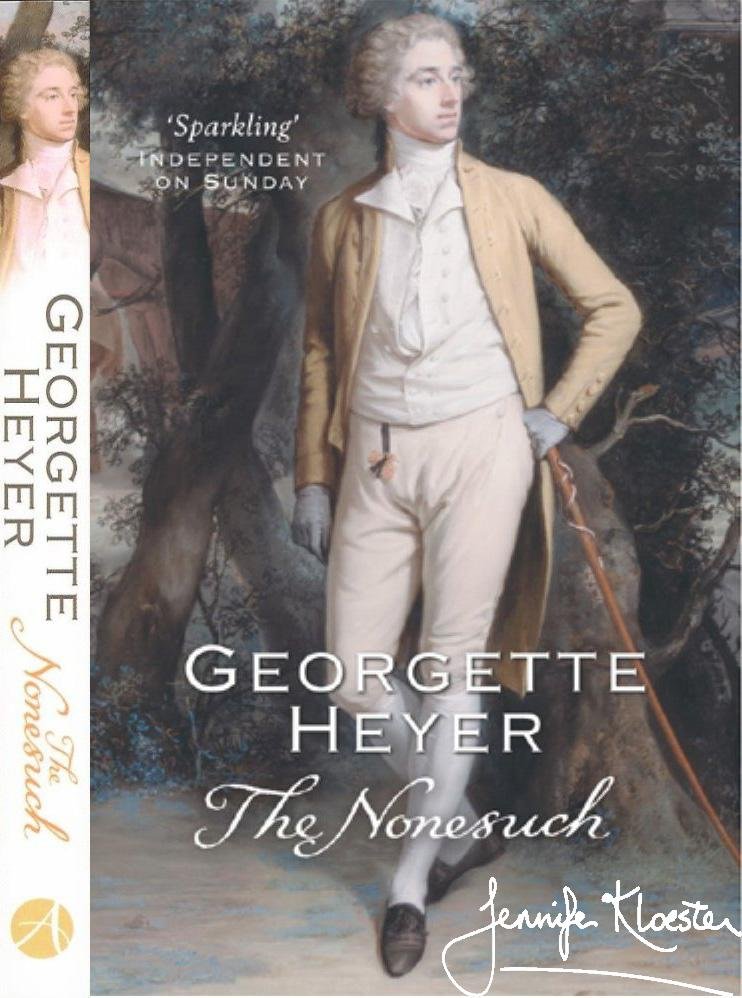
“An out-and-outer”
Not since Beau Wyndham in The Corinthian have Heyer readers been treated to such a complete “out-and-outer” as Sir Waldo Hawkridge – also known as “the Nonesuch”. According to Grose’s 1811 Dictionary of the Vulgar Tongue a nonesuch is “one that is unequalled” Apparently the term was often used ironically, but this was definitely not the case when referring to Sir Waldo. whose elegant appearance, sporting prowess, equestrian skill and manly bearing made the sobriquet entirely apt. But there is much more to Sir Waldo than his expertise in fashion, fishing, shooting, hunting, riding, driving, boxing, and etiquette, for the Nonesuch is also a philanthropist. Carrying on in the footsteps of his late father, Sir Thurstan Hawkridge – also a benevolent humanitarian – Waldo has already created one orphan asylum and, upon inheriting Broom Hall, intends to put the estate to good use and open another. He brings with him to Yorkshire his younger cousin, Julian, Lord Lindeth, who is both handsome and congenial. Uninterested in fashionable life and eager to spend time with his splendid cousin, Julian is almost as eligible a catch as the hugely wealthy Sir Waldo and it is he who catches the eye of the very spoilt, very headstrong beautiful young heiress, Tiffany Wield. Tiffany, too, is a nonesuch – though cast in a very different mould from Sir Waldo! Tiffany is unequalled – both in the book and in all of Heyerdom – in her propensity for throwing tantrums and behaving badly whenever she does not get her own way. Fortunately for all those forced to endure Tiffany’s bad behaviour, there is one person who is able to exert some control over her.
A very superior governess
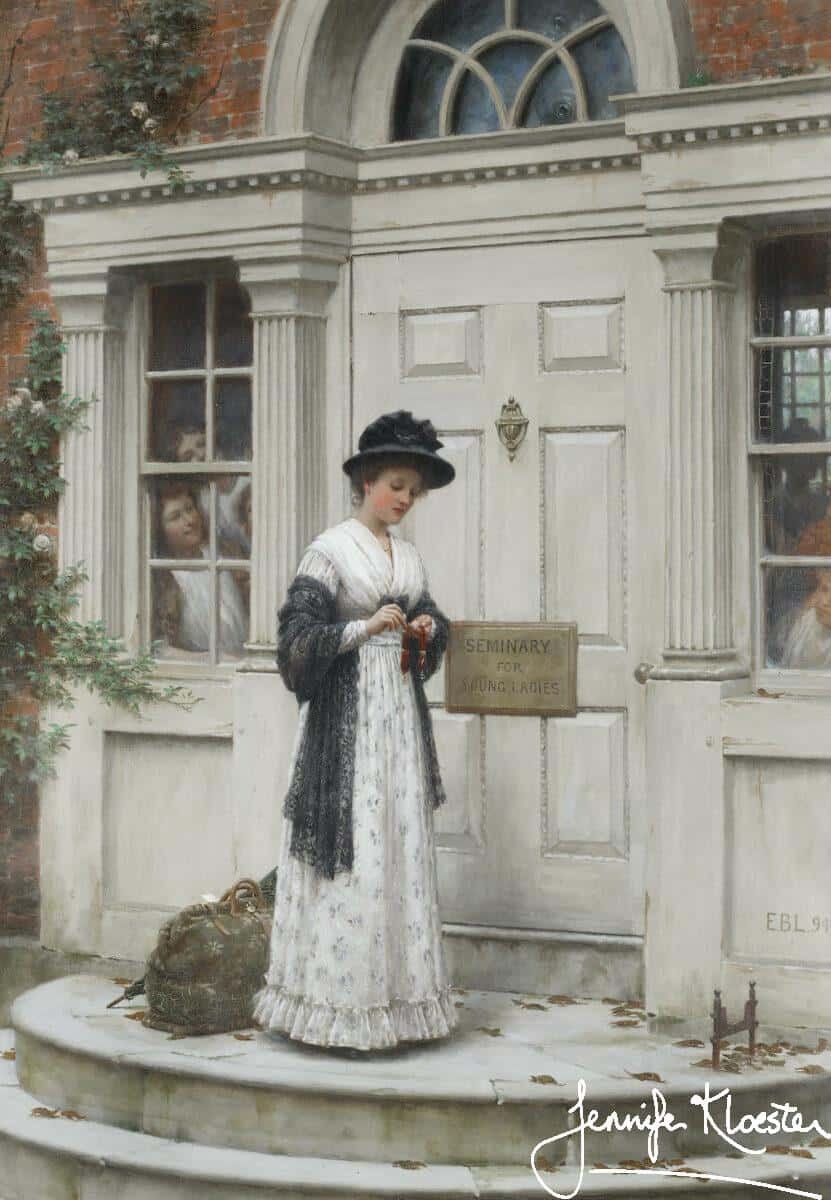
Ancilla Trent is the heroine of the novel. The daughter of a large family, well-bred but not wealthy family she has deliberately chosen not to be a burden. She is twenty-six, Intelligent, honest, well-informed and very good at her job. As “a very superior governess” she is able to command the extraordinary salary of £150 a year. In an era when a housemaid earned a mere £6 a year, this really was a remarkable amount to pay to a governess. Such are the difficulties in managing Tiffany, however, that Miss Trent earns every penny of it. In most cases, a governess was not well-paid for her work and, as Jane Austen points out in Emma it was not a desirable occupation. This is how she describes Jane Fairfax’s decision to support herself by becoming a governess: “With the fortitude of a devoted novitiate, she had resolved at one-and-twenty to complete the sacrifice and retire from all the pleasures of life, of rational intercourse, equal society, peace, and hope, to penance and mortification forever.” During the Regency a governess was usually a woman paid to live in the family home and take sole charge of the children’s care and education. She was often a gently-born female whose financial circumstances compelled her to take one of the few jobs available to such women at the time. For many it meant a lifetime of drudgery, submission and snubs, throughout which they were expected to maintain a cheerful disposition and undertake all manner of tasks outside the schoolroom. For such work they could be paid the princely sum of £50 a year (many received less and a very small number like Ancilla received more). Some governesses were fortunate in being accepted into the broader family circle where they were treated, not as an equal, but neither as a servant; a role similar to that of the family chaplain or private tutor. It was not an easy role and in The Nonesuch as Sir Waldo finds himself drawn more and more to Miss Trent, he becomes less and less able to reconcile her obvious virtues and abilites with the menial role she is forced to fulfill. Ancilla is very good at her job, however, as this early encounter with her difficult pupil shows:
Miss Trent regarded her thoughtfully. “Well, it’s an odd circumstance, but I’ve frequently observed that whenever you boast of your beauty you seem to lose some of it. I expect it must be the change in your expression.”
Startled, Tiffany flew to gaze anxiously into the ornate looking-glass which hung above the fireplace. “Do I?” she asked naively. “Really do I, Ancilla?” “Yes, decidedly,” replied Miss Trent, perjuring her soul without the least hesitation.
Georgette Heyer, The Nonesuch, Pan, 1975, pp. 22-23
Difficulties
As she wrote the novel through March, April and into May, Georgette found that she was not altogether happy with The Nonesuch – although she liked the title. It had been “written under difficulties”. These related to her elderly mother, Sylvia, who had frequently been ill and needed a good deal of her daughter’s time and attention. Georgette gave these as best she could, but it was not easy when she was writing her novel with a deadline. Early in May she wrote to Frere to say:
I shall hope to be able to send you THE NONESUCH by the first week in June, but I make no rash promises! You know that I am anxious to finish it by the end of this month, but it’s going to be a tight squeeze, and when I have finished it I am having it retyped – which might add on another week, I imagine.
Georgette Heyer to A.S. Frere, letter, 9 May 1962.
Her son Richard was being married on 2 June with the reception at Georgette and Ronald’s Albany flat. Of course, this meant additional pressure to finishThe Nonesuch. Georgette managed it somehow and as able to leave on 8 August for her annual holiday as planned. She received the galley-proofs for The Nonesuch just as she was leaving for Scotland and finished correcting them on 16 August 1962. It was her sixtieth birthday and they were at Greywalls where they planned to stay until 10 September. she was on holiday at Greywalls. Unfortunately, this was not to be. Although Georgette and Ronald were expecting their son Richard and his new wife Susie to join them on their summer holiday the day before they were due to arrive at GreywallsGeorgette received a telegram with the news that her mother had suffered a stroke. She and Ronald immediately returned to London and arrived at the hospital to discover Sylvia Heyer partially paralysed and bereft of most speech. Sylvia was eighty-six years old and, though she and her only daughter had not always seen eye-to-eye, Georgette loved her mother.
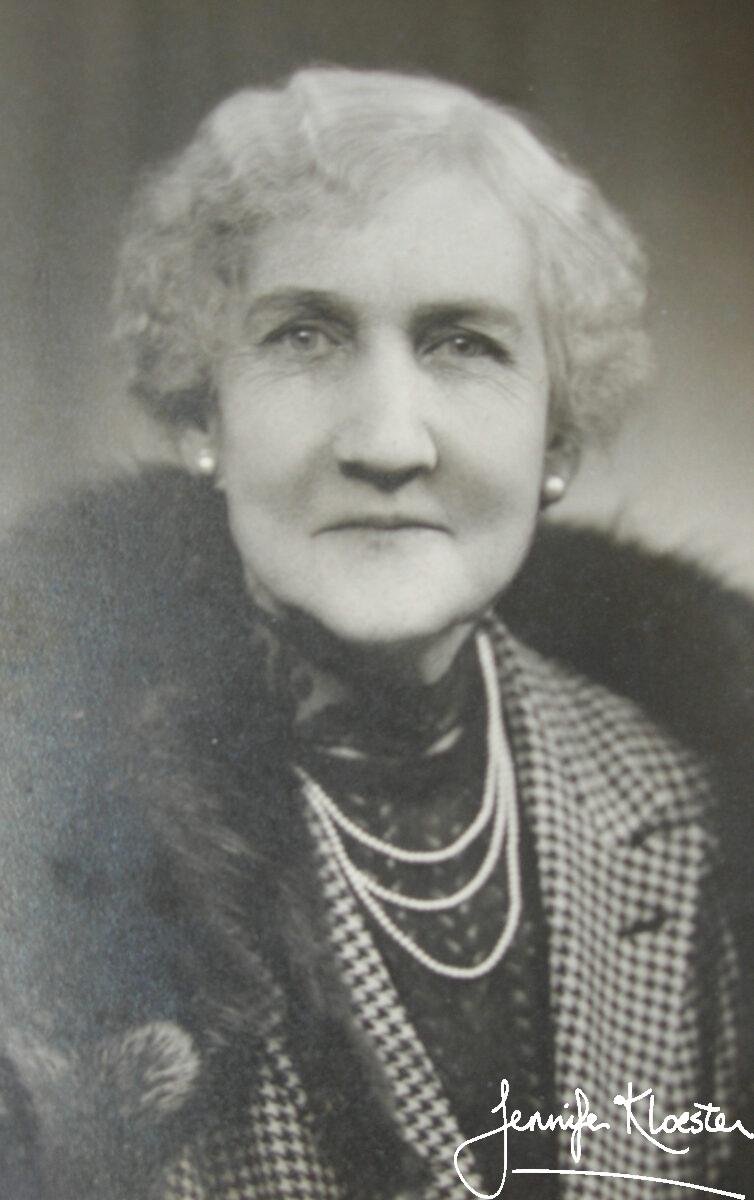
Sylvia Heyer who died only a month after publication of The Nonesuch 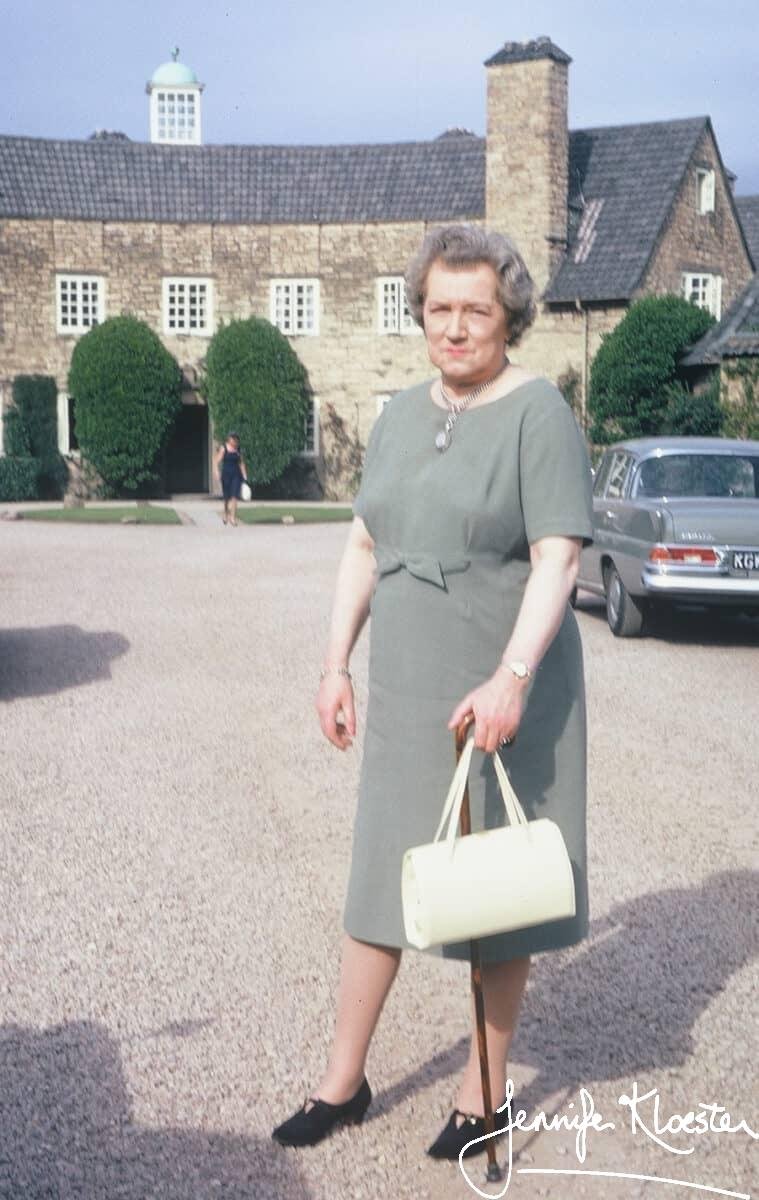
Georgette was at Greywalls when she received news of her mother’s stroke.
Sadness
For the next two months Georgette endured the emotional challenges and physical demands of her mother’s illness. Two months after the stroke that had robbed her of so much, on 27 November 1962, Sylvia Heyer died. Georgette was devastated. Perhaps she and her mother had not been true kindred spirits, but in those later years they had become close. Although her mother sometimes irritated her and Georgette could not always understand Sylvia’s response to her writing, ever since her father’s death in 1925, Georgette had supported her mother. In her turn, Sylvia, at first somewhat dismissive of her daughter’s writing, had come to appreciate her books and was always one of her first readers. It was unfortunate that she often liked those of Georgette’s books which her daughter did not think as good as others of her novels which her mother did not like so well. Perhaps this was inevitable between two such different personalities. But they had a shared history which mattered a great deal to Georgette. It also counted that her mother had loved her husband – Georgette’s adored father. Sylvia had never remarried after George’s death, perhaps because there had never been anyone for her but him. Georgette had been 22 when her father died; she was 60 when her mother passed away, but neither death was easy for her. Not long after Sylvia’s death, Georgette received a letter of condolence from her old friend, Isabella Banton, who had been her landlady at the flat in Hove in 1941-42. In a remarkably candid letter, Georgette expressed her feelings at her loss:
Dear Isabella
Yes, it was Mama: how nice of you to have written! She died of uraemia [kidney failure], following on a thrombosic stroke, which she suffered on August 22nd, eight days after I had gone to Scotland. Since then, life has been an ever worsening nightmare; & although the actual end was peaceful, it had been preceded by every hateful circumstance she most dreaded,& had always hoped would never befall her. Until the last fortnight she always knew me… Only a monster could have wished her to linger on, but her death leaves me feeling shattered, & strangely lost. Exhausted, too.
Georgette Heyer to Isabella Banton, letter, 3 December 1962.
Her last book with Heinemann
In a strange way perhaps it was fitting that the book which came out just before her mother’s death was to be Georgette Heyer’s last book published by Heinemann. He rmother’s death marked the end of an era. Frere’s departure from Heinemann also marked the end of an era. The following year, in company with her fellow authors, Graham Greene and Eric Ambler, Georgette Heyer followed her friend and publisher to The Bodley Head. They would publish her last seven novels.
Dear Mrs Rougier
I thought you would like to learn that we have had ordered a reprint of THE NONESUCH. The book has been having a great success, particularly during the last month when it has been selling at the rate of 1500 copies a week – this in addition to a very handsome subscription at the time of publication. We have now printed in all 57,500 copies.
Derek Priestley to Georgette Heyer, letter, 31 December 1962.
“Queen and huntress”
Here is Ben Johnson’s poem, which Julian, Lord Lindeth, quotes to Tiffany on their first meeting:
Queen, and huntress, chaste and fair,
Now the sun is laid to sleep,
Seated in thy silver chair,
State in wonted manner keep :
Hesperus entreats thy light,
Goddess excellently bright.
Earth, let not thy envious shade
Dare itself to interpose ;
Cynthia's shining orb was made
Heaven to clear when day did close :
Bless us then with wishèd sight,
Goddess excellently bright.
Lay thy bow of pearl apart,
And thy crystal shining quiver ;
Give unto the flying hart
Space to breathe, how short soever :
Thou that mak'st a day of night,
Goddess excellently bright.
Ben Johnson



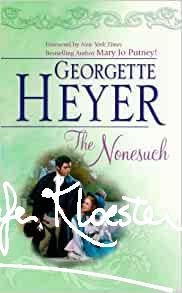
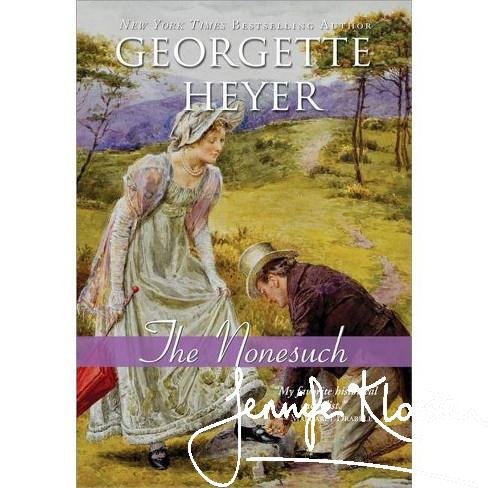


2 thoughts on “The Nonesuch – Heyer’s last book for Heinemann”
I have started re-reading my Georgette Heyers as a bit of light relief from world news, and I’m hugely enjoying these book reviews, especially the poetry and literary references. How widely read GH was! She reminds me of another favourite author, Dorothy Dunnett, in this respect. I’ve just finished The Nonesuch. In my mind’s eye Ancilla is Deborah Kerr, circa The King and I (wrong era I know). The ball scene too reminds me of that movie: “With you or no-one! Come!”
Hi Angela
Yes, GH is such a wonderful relief from world news. I’m so glad you’re enjoying the reviews. They’re lovelt write as it means I can delve into my huge research archive and share more with readers. Dorothy Dunnett was a terrifc writer and also a Heyer fan herself. I can definitely see a young Deborah KErr as Ancilla! Lovely.